|
|
|
Sort Order |
|
|
|
Items / Page
|
|
|
|
|
|
|
| Srl | Item |
| 1 |
ID:
188312


|
|
|
|
|
| Summary/Abstract |
On the 20 March 2003, George W. Bush launched Operation ‘Iraqi Freedom’. At the time, it was unlikely anyone in his administration envisaged that United States (US) troops would eventually rely on the largest force of private military contractors in recent times. Victory over Saddam Hussein and the ensuing occupation and reconstruction of Iraq would have not happened without the support of military contractors working behind the scenes to ensure that combat troops receive adequate supplies, maintain vehicles and equipment, and protect military bases and convoys. In Afghanistan, the US and the other countries participating in the North Atlantic Treaty Organization (NATO) International Security Assistance Force mission relied on contractors providing logistics and armed security to an even larger extent. The NATO-trained Afghan military itself inherited US dependence on contractors, whose departure from Afghanistan alongside American soldiers was identified as one of the factors underlying Kabul armed forces’ inability to confront the Taliban’s advance.
|
|
|
|
|
|
|
|
|
|
|
|
|
|
|
|
| 2 |
ID:
188320
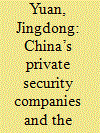

|
|
|
|
|
| Summary/Abstract |
China’s private security companies (PSCs) have become increasingly active actors in meeting the growing demands of Chinese companies operating in high-risk foreign environments for protection and security of both their assets and employees. While growing rapidly in recent decades, Chinese PSCs are relatively new in providing overseas services, remain constrained by lack of well-trained and fully-equipped personnel, and operate under legal uncertainties. Nonetheless, they perform critically important functions in protecting and promoting Chinese security and economic interests abroad. This article provides a preliminary analysis of Chinese PSCs’ introduction to the overseas markets and assesses their performances against opportunities and challenges.
|
|
|
|
|
|
|
|
|
|
|
|
|
|
|
|
| 3 |
ID:
188325
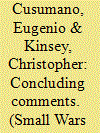

|
|
|
| 4 |
ID:
188323


|
|
|
|
|
| Summary/Abstract |
Contemporary warfare is increasingly shaped by the complex relationship between the privatization of security and technologically driven automation. On the one hand, there is a growing tendency to employ private military and security companies for a range of military support tasks. On the other hand, the growing automation of security technologies is bound to make war less manpower intensive. Combat systems will have much more autonomy and humans will be working more closely with machines than they do today. The article provides an original analysis on the interplay between the privatization of security tasks and technologically driven automation and investigates their impact on the defence industry and the armed forces. These two sets of actors are arguably among the most impacted by the multi-faceted relations between privatization and automation. Technological progress creates the need for contractors to maintain and operate platforms that militaries do not have expertise to run. However, technologically driven automation - often developed in value chains far removed from the military-industrial pipeline - might also replace private contractors in non-core security tasks. The possibility to employ automated and autonomous systems will hence impact on the already delicate balance between private contractors and publicly-funded armed forces.
|
|
|
|
|
|
|
|
|
|
|
|
|
|
|
|
| 5 |
ID:
188314
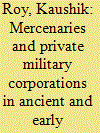

|
|
|
|
|
| Summary/Abstract |
In India, from the time of emergence of empires in circa 300 BCE till the rise of British power in eighteenth century, military mercenaries and private military companies dominated the politico-military landscape. Premodern India had both secular (military guilds) and religious (based on temples and akharas) military corporations. The mercenaries were mostly marginal peasants and demobilised soldiers. They were hired through the agency of their clan leaders, tribal chieftains or the zamindars (large landlords) in whose villages they resided. Historians argue that the presence of the mercenaries and extra state military corporations prevented the rise of strong states in premodern India. In this paper, based mostly on indigenous sources, I argue that the military mercenaries and the private military corporations of pre-British India were at the forefront of technological development. The mercenaries were the channel through which tools, techniques, and ideas of warfare were transferred. The rulers relied on the mercenaries because of their military skills and in the long run they also proved to be cheaper compared to the cost of maintaining permanently a large regular army.
|
|
|
|
|
|
|
|
|
|
|
|
|
|
|
|
| 6 |
ID:
188322
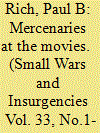

|
|
|
|
|
| Summary/Abstract |
This paper examines cinematic representations of mercenaries from the era of silent movies to the 1980s. It argues that cinema has been selective in the choice of historical periods to depict mercenaries and soldiers of fortune, ignoring for the most part the centuries of European state building in which mercenaries played a significant role. Most mercenary films are anchored in the near present and the paper focuses on Mexico and the Congo as terrains of political breakdown and external intervention. Since the 1950s, a range of films depict mercenaries in these terrains seeking money, adventure, and the thrills of killing, and the paper examines mercenary movies through the character structures of hero, anti-hero and villain. These three structures have shaped the portrayal of mercenaries in westerns and war movies as well as action and sci fi movies, where they have become hardened in the last two decades into range of stock stereotypes
|
|
|
|
|
|
|
|
|
|
|
|
|
|
|
|
| 7 |
ID:
188317
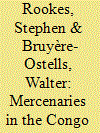

|
|
|
|
|
| Summary/Abstract |
Often maligned by academics and international organisations alike, mercenaries are perceived as being a contributory factor to the worsening of conflict and as a threat to democracy. This chapter demonstrates that this reputation is not wholly deserved, and that in certain cases mercenaries have made a valuable contribution to creating stability in highly unstable contexts. Also, this chapter questions certain interpretations relating to the role and identity of mercenaries. Far from being cold-blooded avaricious killers, we show that there is a range of different reasons why someone becomes a mercenary and argue that the aforementioned categorisation has been used as a political tool.
|
|
|
|
|
|
|
|
|
|
|
|
|
|
|
|
| 8 |
ID:
188313
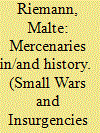

|
|
|
|
|
| Summary/Abstract |
The history of the mercenary seems little less than the history of organized warfare itself. From the dawn of recorded history to the recent rise of Private Military Companies, mercenaries appear as a historical constant that allows scholars to make grand historical claims about the organisation of force within world history. This article cautions against this view, arguing instead that the analysis of this actor has been compromised by the failure to adequately historicise and contextualize the concept of the mercenary due to the uncritical acceptance that mercenaries are a trans-historical occurrence. Informed by a historicist contextual approach, I show how two foundational characteristics of the mercenary concept, a Westphalian understanding of ‘foreignness’ and a modern account of ‘self-interest’, were absent in the periods preceding the 18th century. I demonstrate this absence through an analysis of ‘mercenaries’ in Ancient Greece and the Middle Ages, exposing how the problematization of these actors within their own historical context displays a radical difference if compared to our contemporary understanding of the mercenary. In doing so this article raises awareness to the historical specificity of this seemingly universal concept and cautions against the uncritical backward projection of this concept into the past.
|
|
|
|
|
|
|
|
|
|
|
|
|
|
|
|
| 9 |
ID:
188318
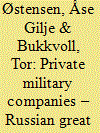

|
|
|
|
|
| Summary/Abstract |
In a situation where the Russian national self-image and economic realities fail to add up, this article discusses whether Russian private military companies have become low-cost tools to restore Russian great power status. Our findings suggest that whenever these companies are used in a ‘power as outcome’ way, they appear less successful at adding great power status on the cheap and less useful at elite enrichment. In contrast, PMCs seem well suited to make power contributions, and for a low cost, in a ‘power as prestige’ way. In these settings they are also more suitable instruments for informal elite earnings.
|
|
|
|
|
|
|
|
|
|
|
|
|
|
|
|
| 10 |
ID:
188324


|
|
|
|
|
| Summary/Abstract |
The increasing demand for cybersecurity has been met by a global supply, namely, a rapidly growing market of private companies that offer their services worldwide. Cybersecurity firms develop both defensive (e.g. protection of own networks) and offensive innovations (e.g. development of zero days), whereby they provide operational capacities and expertise to overstrained states. Yet, there is hardly any systematic knowledge of these new cybersecurity warriors to date. Who are they, and how can we differentiate them? This contribution to the special issue seeks to give an initial overview of the coordination between public and private actors in cyberspace. I thus explore these new private security forces by mapping the emerging market for these goods and services. The analysis develops a generic typology from a newly generated data set of almost one hundred companies. As a result of this stock-taking exercise, I suggest how to theorize public-private coordination as network relationships in order to provide a number of preliminary insights into the rise of this ‘brave new industry’ and to point out critical implications for the future of private security forces.
|
|
|
|
|
|
|
|
|
|
|
|
|
|
|
|
| 11 |
ID:
188316


|
|
|
|
|
| Summary/Abstract |
This article will explore the differing attitudes among British parliamentarians towards the use of German soldiers in 1756 and 1776. Utilising speech act theory, it will be shown that German soldiers were constructed as mercenaries in 1776 because they were being employed to fight against British subjects – the North American colonists. However, when nearly identical German soldiers were employed to fight against a French adversary in 1756, they were not constructed as mercenaries. It will be concluded that the mercenary as a figure of war is not a static, transhistorical concept with universal characteristics. Rather, the mercenary is socially constructed, and, as such, is only made possible in specific historical and socio-political contexts.
|
|
|
|
|
|
|
|
|
|
|
|
|
|
|
|
| 12 |
ID:
188319


|
|
|
|
|
| Summary/Abstract |
This article suggests based on the case study of the United Arab Emirates (UAE) that mercenaries as commercial surrogates can become an integral part of an overall effort of military transformation helping regimes in the Middle East to increase military capacity and capability on the battlefield. As the most assertive Arab state post-Arab Spring, the UAE arguably shows the greatest discrepancy between ambitiousness of its strategic objectives and available in-house capacity and capability among states in the region. Consequently, despite its ongoing military transformation, the Emirates more than any other Arab state had to inevitably draw on external surrogates to maintain their military presence in Somalia, Yemen, and Libya. Thereby, the case study of the UAE is quite exceptional in the region, as it has set a new trend for the commercialization of military services at the higher end of the military spectrum when translating capital into military capability and capacity. This in turn confronts Abu Dhabi’s western partners with difficult choices as they rely increasingly on the UAE to bear the burden of conflict in the region.
|
|
|
|
|
|
|
|
|
|
|
|
|
|
|
|
| 13 |
ID:
188315


|
|
|
|
|
| Summary/Abstract |
This article compares two military formats employed in late Medieval Europe. Italian cities contracted out entire military campaigns whereas European monarchies recruited mercenaries in their armies, led by national commanders. How effective were these private armies? When did mercenaries threaten their employers? The article investigates the enterprises of mercenary captains Castracani and Hawkwood in Italy, and mercenaries in France. Private armies were often effective on the battlefield, though public authorities were not always able to control them. Mercenaries’ military strength and governments’ ability to sanction them were decisive for the outcome of these embryonic forms of civil-military relations.
|
|
|
|
|
|
|
|
|
|
|
|
|
|
|
|
| 14 |
ID:
188321
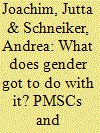

|
|
|
|
|
| Summary/Abstract |
While war and the military have been recognized as being gendered sites, Private Military and Security Companies (PMSCs) are only rarely studied through a gender lens. Compared to functional, political-instrumental or ideational explanations with respect to the privatization of security, such a lens captures, however, the micro-dynamic and political processes of PMSCs’ boom. We show that gender is, first, constitutive of companies’ corporate identities as hero warriors and professional security experts. Second, it is relational, (re-)producing hierarchical power relations among and within PMSCs and with state security actors. Third, gender is a legitimizing factor helping PMSCs to establish themselves as acceptable security actors vis-à-vis others.
|
|
|
|
|
|
|
|
|
|
|
|
|
|
|
|
|
|
|
|
|